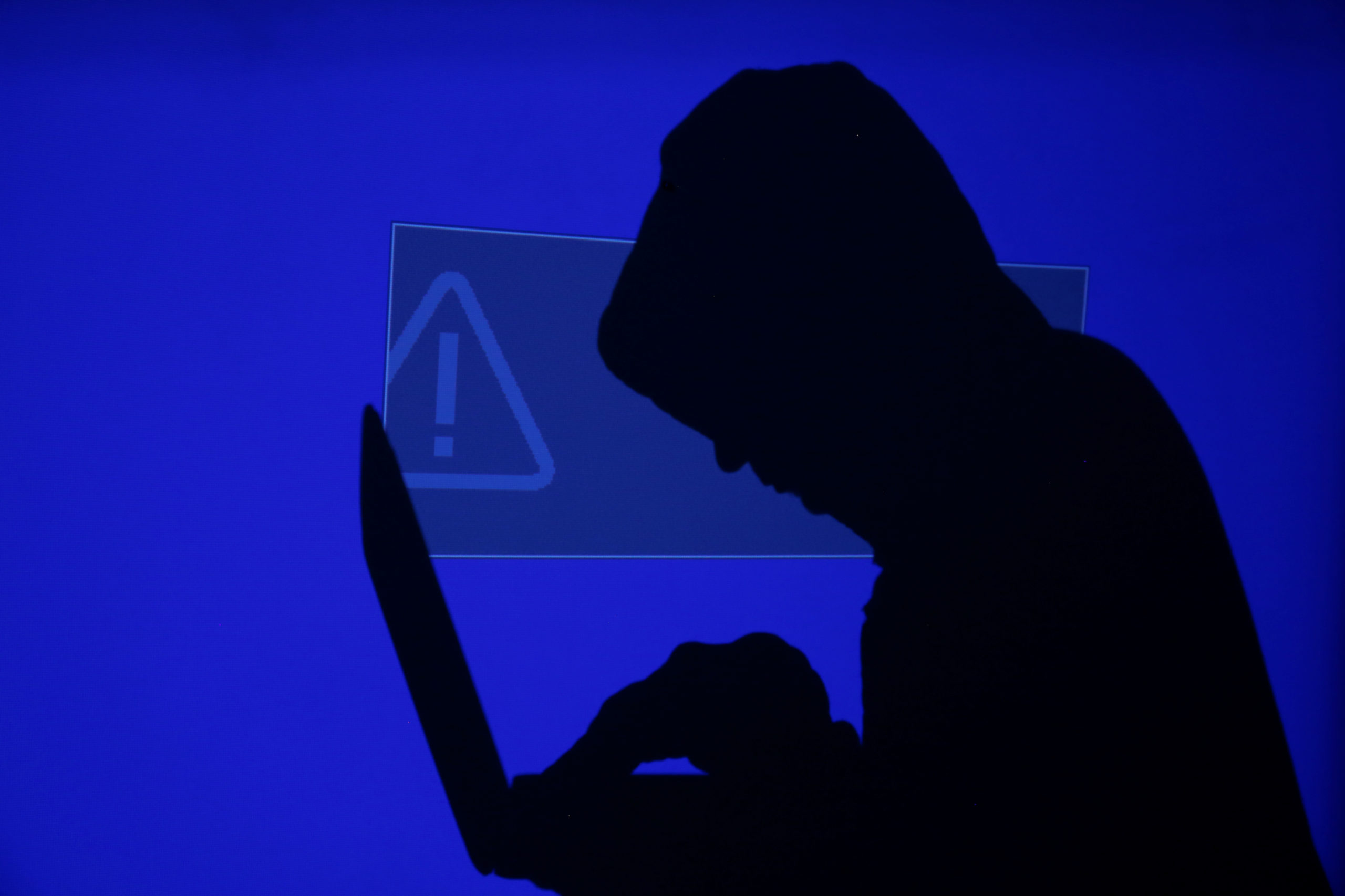Filipinos must be careful in doing online transactions, says think tank

FILE PHOTO: A hooded man holds a laptop computer as a blue screen with an exclamation mark is projected on him in this illustration picture taken on May 13, 2017. REUTERS/Kacper Pempel/Illustration
MANILA, Philippines — A think tank and advocacy group has advised Filipinos to be responsible in doing digital transactions, saying the public should be wary of cybercrime activities.
According to CitizenWatch Philippines co-convenor Tim Abejo, a lot of Filipinos are now doing a huge bulk of daily activities online, to avoid exposure from COVID-19. Hence, scrupulous individuals have tried to take advantage of this situation in committing cybercrime.
“The pandemic has pushed most of us to shift our activities online. We now do our banking, shopping, schooling, over the internet. We order food online and do our work from home. These have their benefits, of course, but they also carry great risk,” said Abejo who is also a lawyer.
“There are many who are out to take advantage of unsuspecting internet users. We have to make sure that our people arm themselves against these online predators,” he added.
Abejo explained that it is now hard to spot websites or emails that has the potential to be a cybercrime, because perpetrators are now making emails and messages appear legitimate.
Article continues after this advertisementWhat he suggests, is to increase awareness about how cybercrime is being done, and with the government incentivizing private organizations and companies that are promoting awareness regarding cybercrime activities — especially since malicious software and online fraud is rising in the country.
Article continues after this advertisement“Government should incentivize private initiatives to engage the education sector such as the Digital Thumbprint Program of digital solutions company Globe in partnership with the Department of Education that has integrated into the curriculum the training of young students to be knowledgeable in cybersecurity and responsible digital citizenship.” he said.
“More public private engagements in digitally powered interventions can give free online access to workshop modules to arm people with the knowledge and attitude to responsibly and safely navigate the internet,” he added.
During the pandemic period, the number of cyber tips received by the Department of Justice – Office of Cybercrime tripled to 1.2 million in 2020 from just 400,000 the previous year. Most common among internet crimes are fraud, sexual abuse and exploitation, bullying, and identity theft.
Before the COVID-19 pandemic, the country already saw a rise in cybercrime cases, as the Philippine National Police (PNP) recorded only 42 cases of online scam in 2013, compared to 550 in June 2019.
Similarly, online identity theft incidents increased (23 in 2013 to 258 in 2019), as well as system hacking (12 to 193), and ATM or credit card fraud (1 to 59).
READ: Cybercrime on the rise over the last 6 years
Cybercrime activities however increased during the pandemic. The Bankers Association of the Philippines (BAP) in 2021 estimated that over P1 billion were lost to criminal groups through unauthorized bank withdrawals.
READ: Bank clients lose over P1 billion to cybercrime
Worse, children are believed to be among the most vulnerable to cybercrime. Last September 2020, the United Nations Children’s Fund (UNICEF) warned that the pandemic has led to an increase in cases of child sexual exploitation and online abuse as children are given more access to online platforms.
As classes are also done online, Abejo said this gives individuals the chance to manipulate children.
“For two years now, they cannot go out to play or go to school or to meet their friends,” he said. “Instead, they are constantly online to study, play or socialize. This provides predators the opportunity to manipulate them for their own gains.”
“Sure, there have been arrests. But these people are always one step ahead and they are bound to come up with newer, more sophisticated ways to launch cyber-attacks,” Abejo said.
Also, the CitizenWatch head believes telecommunication companies should partner with the government to ensure that risks on the online platforms would be mitigated.
“Specifically, telcos and ISPs should partner with the government to engage in an aggressive and sustained education program to raise awareness of online dangers,” Abejo explained.
“Technology is good because it allows societies to be productive and innovative, and reach their potential. We must manage the inherent risks and learn how to protect ourselves against those who think they can use the internet to advance their criminal interests,” he added.